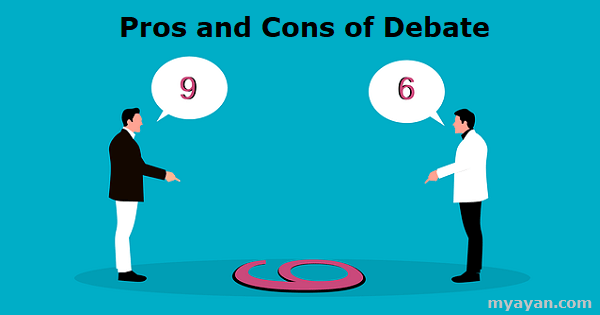Believe it or not, at some point in life, everyone must have been a part of a debate, personal or professional. Debates are a part of the political process that can help you make decisions and shape others’ opinion. They provide you an opportunity to hear from different viewpoints and understand the perspective of others. However, there are pros and cons to debate that you must consider as there is always a winner and the one who loses.
Students are encouraged to participate in debates from an early stage. Individuals start learning to question the system and voice their opinions. The following include the pros of the discussion.
Debates are an effective solutions to express your opinions and prove your points logically and evidently. You have all the details and facts lined up to support your argument. This way you can express yourself effectively and have an impact over your opponent.
Taking part in debates helps to enhance public speaking skills. You need to think on your feet while responding to opposing arguments confidently and coherently. Not just public speaking, you become polished at communication skills as you lay your concerns to the public as a speaker.
Debating is a great way to explore the issues of concern deeply. It encourages team members to research diverse perspectives and uncover potential solutions. Through rigorous analysis and discussion, debating teams enhance their readiness to tackle a wide range of problems.
Furthermore, this process cultivates your expertise on the topics you engage with, leading to a concrete and clear understanding. This expanded knowledge proves invaluable when confronting future debates and other challenges in life.
A debate requires participants to thoughtfully consider their arguments as well as the opposing viewpoints. This fosters an environment where individuals can delve into diverse perspectives, assess evidence, and gain a deeper understanding of complex issues. Moreover, it presents a unique opportunity for participants to refine their research skills while crafting compelling arguments and counter-arguments.
You should be a good listener besides being a good speaker. That’s 505 of your debate. You put your ideas and opinions about a topic based on your information, the opponent does the same counteracting your points. Listening to the other side of the story, helps you cultivate patience and temperament. It ultimately helps to bridge the gap between opposing views and promotes understanding.
As mentioned earlier, there is a winner and a lower in debating. We not always have a fruitful conclusion while expressing our side of opinions. That’s where you must be aware of the cons of debate.
It’s all about how well you prepare your topic; it takes time, hard work and lots of research. Debates often take time since participants must present their arguments organized, and the opposing sides need time to respond.
Debates are never a win-win; there is always the opposition to deal with and sometimes, argument can take sour turns. Debates can become unproductive if participants disrespect each other’s opinions. If too much focus is on trying to prove one another wrong, then it can derail the original purpose of the debate.
Not all arguments presented in a debate are based on facts. There are alywas chances that people can easily be biased and provide inaccurate information to prove their point, leading to wrong conclusions.
Participants can be biased and make decisions without looking at the bigger picture. This can lead to unbalanced results when the debate is one-sided or focuses too much on personal opinion.
Debates are only sometimes appropriate for some situations. Some topics may need to be more sensitive to discuss or research before a conclusive answer can be reached.
Pros and Cons of Debate – Conclusion
Debates can be powerful and productive part of a communication when used in the right way. The pros of debate far outweigh the cons if you understand how to do it effectively. Engaging in argumentative discussions can stimulate the generation of better ideas and solutions, facilitating efficient collaboration within creative and cohesive teams.
It is crucial to understand effective communication strategies. Maintaining respect, formality, and friendliness when participating in discussions is of utmost importance. Ultimately, the choice lies with each individual to utilize debate as a constructive tool or allow personal egos to hinder progress.

Debates' fast pace and aggressive nature tend to make them more heated and emotional. This usually results in less clarity of thought, and so increased polarization. Through the nature of debate, a lack of understanding of the views and opinions of others can be perpetuated.
Debates can be a great way to explore ideas and gain insights into different perspectives. It also encourages research and critical thinking, as well as developing verbal communication skills. Debating can help understand an opposing viewpoint, making developing strategies for addressing issues easier.
Enhancing learners' analytical, research, and note-taking skills. Bolstering their ability to craft well-balanced, informed arguments backed by reasoning and evidence. Cultivating proficiency in speech composition and delivery for maximum impact.
Debate instills in individuals the significance of being attentive in two distinct ways. Firstly, developing a strategic listening approach cultivates mental readiness to listen. When engaged in a debate, one deliberately listens for specific elements as counterpoints to address flaws in reasoning, supporting evidence, and critical arguments. This enhances the ability to listen actively and the skill to analyze and respond effectively critically.